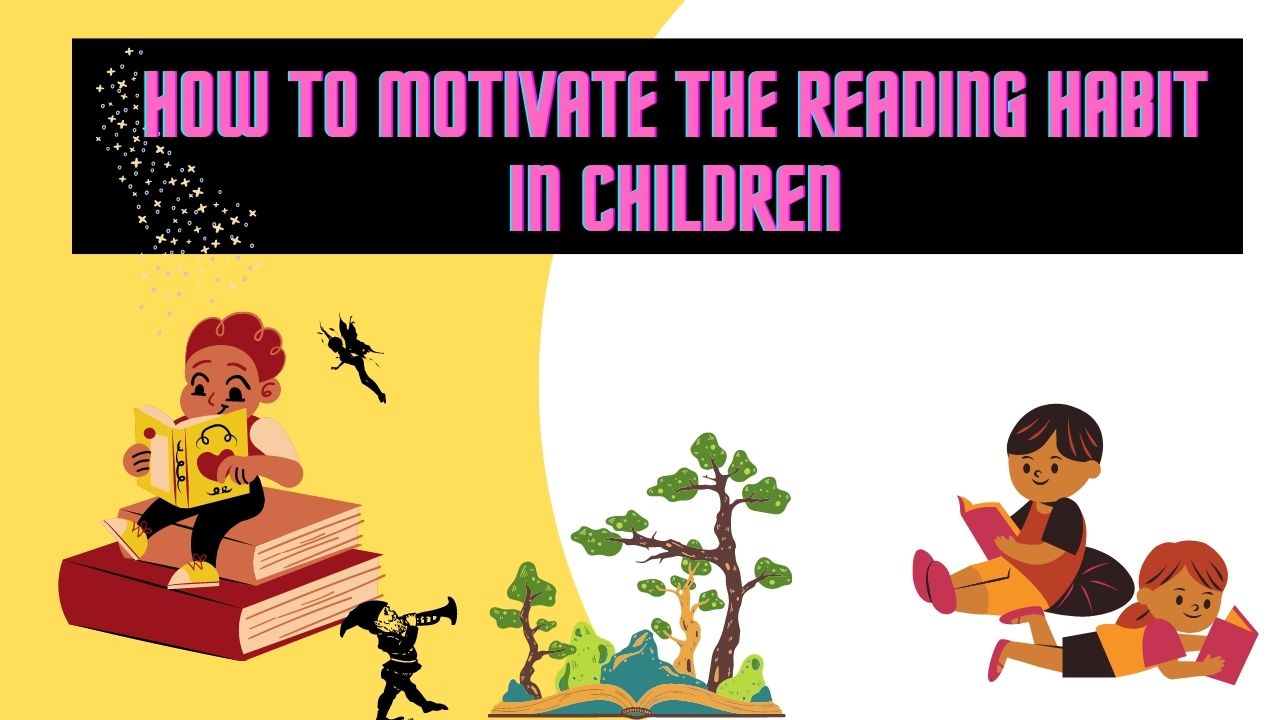
Imagen diseñada por mi en el editor de Canva.
Reading is to know every day a new universe, is to travel through the letters, exploring great stories and meeting incredible characters, is a window to knowledge and culture, however unfortunately perhaps due to technology or the various activities that we must develop each time it becomes more and more difficult to develop motivation in reading in children, but do not worry that even so it is not impossible, so I bring you some tips and strategies that you can carry out to make your children become great readers, or who knows, if even great writers.
Leer es conocer cada día un universo nuevo, es viajar a través de las letras, explorando historias grandiosas y conociendo personajes increíbles, es una ventana al conocimiento y a la cultura, sin embargo lamentablemente tal vez debido a la tecnología o a las diversas actividades que debemos desarrollar cada vez se hace más y más difícil desarrollar la motivación en la lectura de los niños, pero no se preocupen que aún así no es imposible, por eso les traigo algunos consejos y estrategias que puedes llevar a cabo para hacer que sus niños se vuelvan grandes lectores, o quien sabe, si hasta estupendos escritores.

1 You must know what they like
1 Debes conocer sus gustos
In order to choose a good book that your children will enjoy and to make reading enjoyable and pleasant, it is necessary to know what kind of stories they like and what characters they find most attractive, and for this you must spend time with them, talking, asking them questions, it doesn't have to be too long, just 20 or 30 minutes will be enough, it is quality time in which you will learn to know your children in order to understand them better.
Para poder elegir un buen libro que tus hijos disfruten y lograr que la lectura sea amena y agradable, es necesario conocer qué tipo de historias le gustan y qué personajes les parecen más atractivos, y para ello debes pasar tiempo con ellos, conversando, haciéndoles preguntas, no tiene que ser demasiado tiempo, bastará con solo 20 o 30 minutos, es un tiempo de calidad en el que aprenderás a conocer a tus hijos para poder entenderlos mejor.

2) Draw up a list of books
2) Elaborar una lista de libros
Another activity parents can do when spending time with their children is to make a list of books that (according to their tastes) might appeal to them, and if parents have already read those books before, it would be good to tell them a bit about them to motivate them even more.
Otra de las actividades que los padres pueden hacer cuando pasan tiempo con sus hijos es hacer una lista de los libros que (según sus gustos) a ellos le podrían atraer, y si los padres ya han leído esos libros antes, sería bueno que les hablaran un poco acerca de ellos para motivarlos aún más

3) Establish a timetable
3) Establecer un horario
Once you have the books you want to read, you can set a time together when you are going to start the new adventure, you can use fun names to call this time, perhaps something like "Reading Magic Time" or "Time to get on the letter train", this will add dynamism to the activity and make your child look forward to the time when they can sit down and read with you.
Cuando ya tengan los libros que deseen leer, pueden establecer juntos un horario en que van a comenzar la nueva aventura, puedes usar nombre divertidos para denominar ese momento, quizá algo como “La hora mágica de la lectura” o “La hora de subir al tren de las letras”, esto le proporcionará dinamismo a la actividad y hará que tu hijo desee con todas su fuerzas que llegue el momento de sentarse a leer contigo.

4) Creating a space for reading
4) Crear un espacio para la lectura
I think the experience will become more fun if you set up a specific place in your house where you and your children will read, it can be a corner in the children's room or in the living room, any space where they feel comfortable. Put cushions on the floor, make sure the temperature is comfortable and it would also be great if they decorate the wall of that special corner in relation to the story they are reading, for example, if it is a story about castles and fairies, you can use stickers of that kind, or they could also build a kind of shelter or tent with sheets.
Pienso que la experiencia se volverá más divertida si acondicionas un lugar específico de tu casa en el que tus hijos y tú se dedicarán a leer, puede ser un rincón de la habitación de los niños o en la sala, cualquier espacio en el que se sientan cómodos. Pon cojines en el piso, asegúrate de que la temperatura sea agradable y también sería genial si decoran la pared de ese rincón especial en relación con la historia que están leyendo, por ejemplo, si es un cuento sobre castillos y hadas, puedes usar stickers de ese tipo, o también podrían construir una especie de refugio o carpa con sábanas.

5) Using question cards
5) Usar tarjetas de preguntas
You can create some cards using cardboard or paper with questions such as "Who is your favourite character and why do you like them?" "Name at least 5 characters" "Tell me what was your favourite scene in this chapter" "What would you have done if you had been in this character's place?", just to give an example, but you can use any questions you like and decorate the cards as you like. At the end of the reading you can put them face down on the floor and have your children choose two or three of them to answer the questions. This activity will allow you to see how far your child's reading comprehension has progressed.
Puedes crear algunas tarjetas usando cartulina o papel con preguntas como “¿Cuál es tu personaje favorito y por qué te gusta?” “Nombra al menos 5 personajes” “Dime cuál fue tu escena favorita de este capítulo” “¿Qué hubieses hecho tú si hubieses estado en el lugar de este personaje?”, solo por poner un ejemplo, pero puedes usar las preguntas que quieras y adornar las tarjetas a tu gusto. Al final de la lectura puedes ponerlas boca abajo en el piso y hacer que tus hijos escojan dos o tres de ellas para responder las preguntas. Esta actividad te permitirá comprobar que tanto ha avanzado su comprensión lectora.

6) Exchange books
6) Intercambiar libros
Once they have finished reading, you can encourage your children to exchange their books with their friends, thus not only enriching their knowledge, but also promoting the value of sharing.
Una vez que hayan terminado de leer, puedes exhortar a tus hijos a que intercambien sus libros con sus amigos, de esta forma no solo enriquecerán sus conocimientos, sino que además promoverán el valor de compartir.

7) Making drawings
7) Hacer dibujos
It is not of utmost importance but it is advisable that the books you are reading with your children have pictures, as this will help to capture and hold their attention, but you can also encourage them to develop their creativity by asking them to draw their favourite character or a scene, maybe even a new cover for the book.
No es de suma importancia pero sí es recomendable que los libros que estés leyendo con tus hijos tengan dibujos, ya que esto ayudará a capturar y retener su atención, pero también puedes incentivarlos a desarrollar su creatividad pidiéndoles que dibujen a su personaje favorito o una escena, quizá hasta una nueva portada para el libro.

8) Big letters
8) Letras grandes
It is very important, especially if your children have only recently learned to read, that the print in books is large, because large print is more attractive to the eye, costs less to read and helps to capture and retain attention more effectively than small print.
Es muy importante, sobre todo si tus hijos acaban de aprender a leer hace poco, que las letras de los libros sean grandes, porque las letras grandes son más atractivas a la vista, cuesta menos leerlas y ayudan a capturar y retener la atención con mayor efectividad que las letras pequeñas.

Esta foto es de un libro que yo conservo desde mi infancia, la tomé con mi teléfono celular LGK4 Lite.

Well friends, those are my eight tips for you to develop the habit of reading in your children, I applied them in my years of practice at the university when I studied early childhood education, they are methods that I invented but the truth is that they helped me a lot and gave great results, I hope you like them and that they also work for you. Thank you very much for your attention and time.
Y bien amigos, esos son mis ocho consejos para que ustedes puedan desarrollar el hábito de la lectura en sus hijos, yo los apliqué en mis años de práctica en la universidad cuando estudié educación inicial, son métodos que inventé pero la verdad me ayudaron mucho y dieron grandes resultados, espero que a ustedes les guste y que también les funcione. Muchas gracias por su atención y su tiempo.

Imagen diseñada por mi en el editor de Canva
Some good advice - and such an important thing to do. It is becoming far more common that we have illiterate teenagers, who, no doubt, will turn into illiterate adults. Quality of life has to be impacted at that point in time when they can't access education - I think the other tip you might have included is making reading a habit, and part of that is parents have to read WITH their children each night - making it a priority.
Yes, there are certainly many children who do not have access to education and that is a serious problem that we need to solve as a society, perhaps by donating books or doing reading activities in communities that do not have access to education. And it certainly seems unforgivable to me that parents who do have access to books, do not dedicate themselves to reading them with their children, it is something that should become a habit, because a child who reads today will become an educated adult tomorrow.
Thank you very much for reading and commenting.
What a helpful article! I think that we all need to do more of this to children to raise reading awareness. Thanks for sharing this with the community!
Thank you for allowing me to write in this beautiful community, we all have to do our bit to build a better world, and the only way to do it is through education, that's why we have to pay more attention to children.